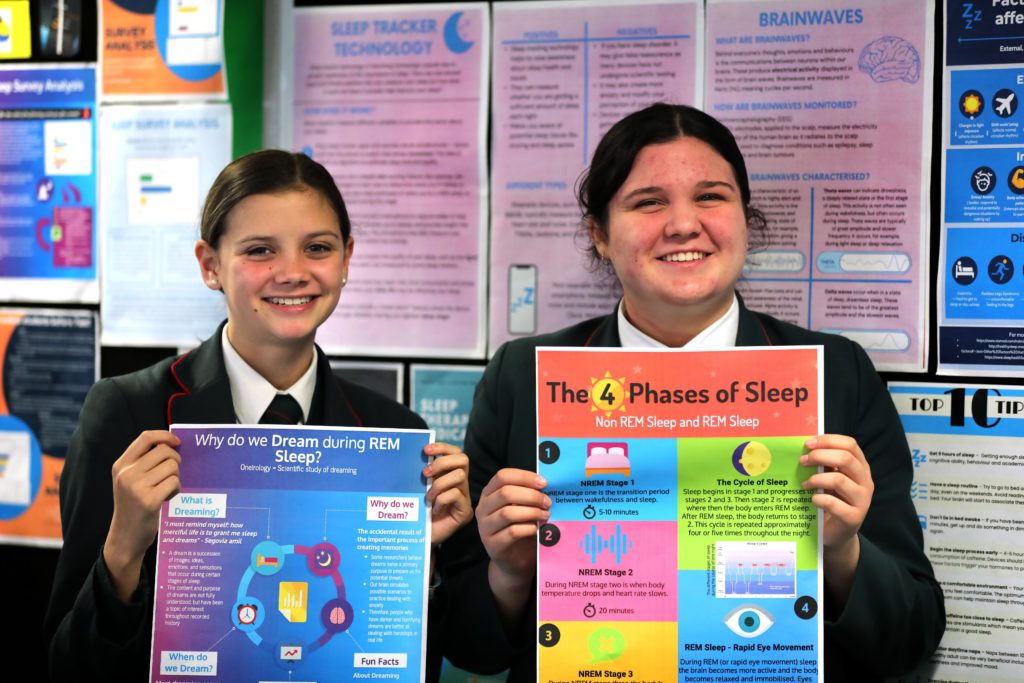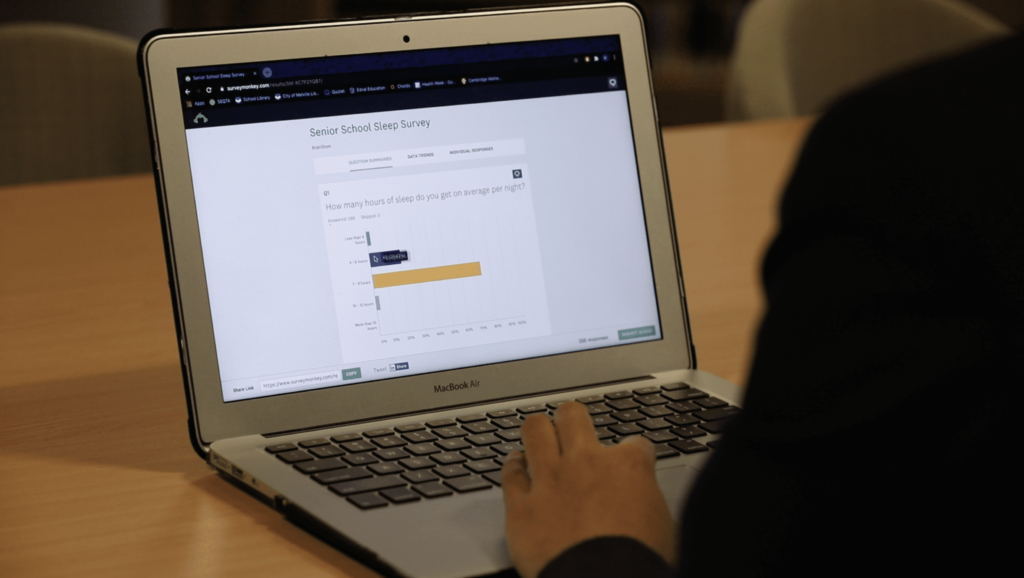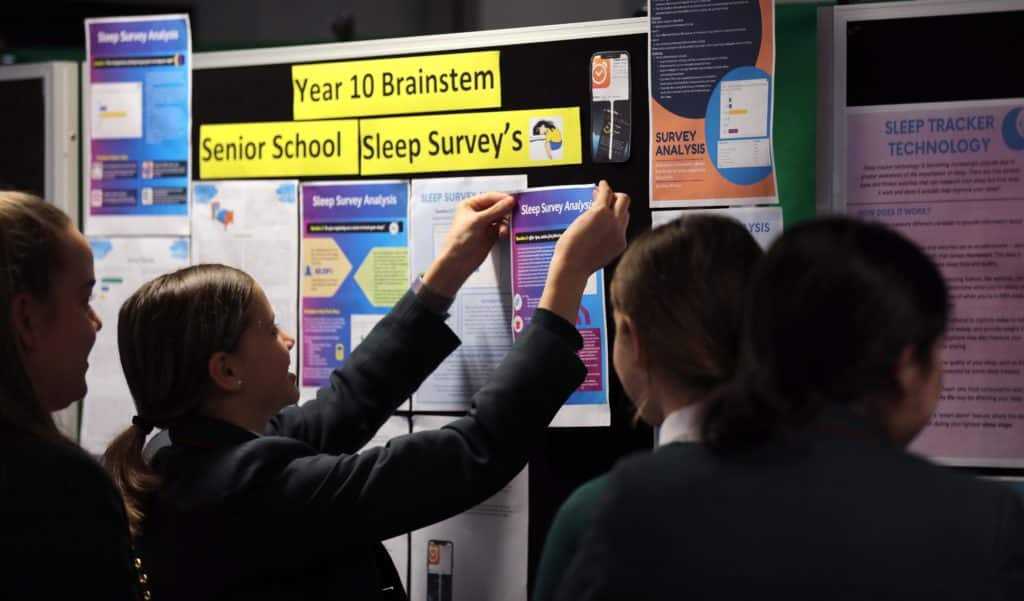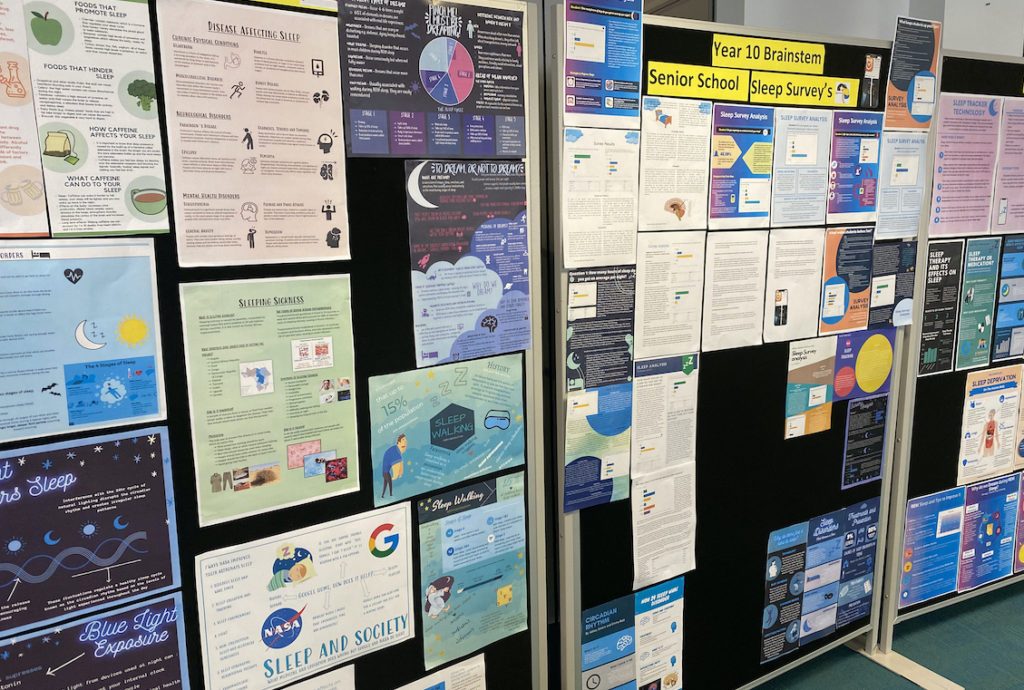BrainStem: The Importance of Sleep

We all know sleep is important, but still many of us feel we don’t get enough. Just how much sleep do we actually need and what can we do to improve our quality of sleep?
Our Brain Stem students have been learning about the science of sleep and the importance of sleep to our health, learning and memory. The girls also looked at ways they could educate their fellow students about their findings and provide some suggestions to improve sleep quality.
The girls collectively designed a survey of ten questions. The survey was then distributed to students in Years 10 – 12. The Brain Stem classes received an amazing 280 responses to their survey.

Here are some of their findings and what the girls have learnt.
Survey Question: Do you use a sleep tracker mode on your smart watch or App on your phone?
Lauren Winship
- Most people have never used a sleep tracker
- Very few people are using a sleep tracker
Survey Question: Why people don’t use a sleep tracker?
Abby Young
- Many students charge their devices throughout the night, so their watch cannot be worn at night
Charlotte Parsons:
- Some people don’t want to know how many hours of sleep they get
- Don’t want to know if they aren’t sleeping well
Claudia Cirocco
- Having their sleep tracked can make them paranoid that they are not getting enough sleep
- Perhaps, it tells us that most people don’t know the importance of sleep so therefore have not thought to investigate how much sleep they get.

What did you find interesting about the student responses in the survey?
Terezina Pearson
- I found it interesting because not a lot of people followed the recommendations of sleep.
- The recommended hours of sleep are 9 – 10, but we found out that most people surveyed get 7-9 hours (approximately 75%) – less than recommended amount.
Alexandra Hackett
- Most people (63%) eat dinner 3 – 5 hours before going to bed, which is good because nutritionists say it is good for digestion, not to sleep with undigested food in your stomach.
What are some of your tips for better sleep?
Claudia Cirocco
- Build up a bedtime routine. This enables your body to include this in its natural circadian rhythm.
Ava Letter
- You should not use a device less than half an hour before bed because blue light blocks the production of melatonin, which makes you feel tired before you try to go to sleep (64.6% of responders indicated they use their devices 0-10 minutes before going to bed).

Why is it important to get enough sleep?
Abby Young
- Improves memory and concentration
- Assists you during the school day to function at your optimum.
Abbey Winship
- Significant benefits for the heart.
- Eg Sleep targets the blood vessels, heart rate and blood pressure – raised blood pressure can be a result of continual lack of sleep
- Hormones are affected by sleep – including cortisol (stress), insulin (glucose regulation)
Charlotte Parsons
- During REM sleep you spend 30% storing important information from the day and discarding irrelevant information
- Sends signals and interprets them as dreams
- Dreaming helps with your memory, creativity and learning
- If you don’t sleep, you don’t have time to take in all that information

What did learn about writing effective survey questions?
Ava Letter
- The questions cannot contain any sort of opinion, as this introduces bias to the question. Ie your opinion might influence the way people respond
Lauren Winship
- Don’t use double barrel the questions
- Reduce the number of open-ended questions, where the responses are controlled to set responses.
Terezina Pearson
- By running pre-tests of the survey, issues such as not coming up with a response that the target audience would all choose can be detected. Pre-tests also highlight errors in the formatting of the questions.
The girls have created posters and infographics with their findings. These will be displayed in the library for the next week.

The Power of Expectations in Shaping Student Success – Jennifer Oaten
Discover the transformative impact of expectations on student success. Learn how belief shapes outcomes in education and beyond.

Weekly Wrap Up: Term 2, Week 1, 2024
Term 2 has kicked off with a bang! We enjoyed the Year 11 Father-Daughter evening, celebrated Earth Day, and welcomed Dr. Mark Williams.

Inspiring Change: Earth Day 2024
Our Earth Day celebration this week was a powerful reminder of our collective responsibility to protect our planet for future generations.
- Collaboration, ConnectingLearning2Life, CriticalThinking, Curiosity, Featured
Author: Santa Maria College
Santa Maria College is a vibrant girls school with a growing local presence and reputation. Our Mission is to educate young Mercy women who act with courage and compassion to enrich our world. Santa Maria College is located in Attadale in Western Australia, 16 km from the Perth CBD. We offer a Catholic education for girls in Years 5 – 12 and have 1300 students, including 152 boarders.






